Don’t you just love the taste of cinnamon? And the smell? With this homemade cinnamon toothpaste you don’t only add this delicious flavour to your daily oral care routine, you also do something good for your teeth!
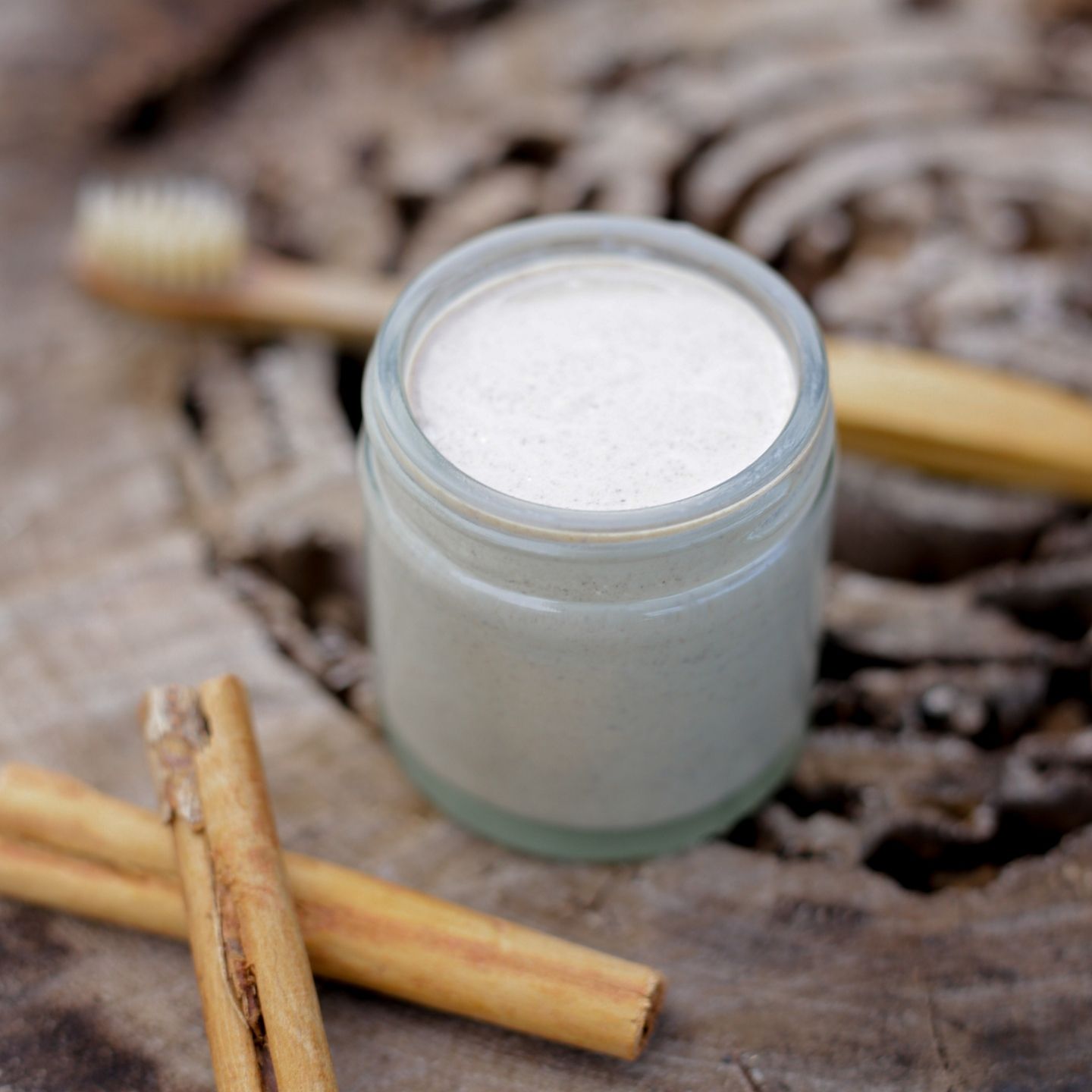
Because cinnamon has actually quite a few benefits when it comes to oral health! By adding this spice to your homemade toothpaste, you fight bad bacteria, bad breath and soothe inflammations and toothaches!
For this recipe, I give you two choices how you could use cinnamon: one is with the regular ground spice and the other uses essential oils. Certainly, you could also use both—that’s what I always do!
What’s in this homemade cinnamon toothpaste?
- Cinnamon (ground, essential oil)
- Coconut oil
- Bentonite Clay
- Xylitol (optional)
For more ingredients that you could additionally put into this homemade cinnamon toothpaste, check out my complete beginner's guide to making your own toothpaste!
Cinnamon
- antibacterial
- anti-inflammatory
- anti-fungal
- fights bad breath and gum disease
- relieves toothache
Cinnamon doesn’t only taste and smell nice, it is in fact a great ingredient for your homemade toothpaste. It’s antibacterial properties help fight cavities, reduce bad breath and relief tooth pain!
It is furthermore said that it’s also healthy for our gums. However, I came across some blog posts on my research where, for example, one of the bloggers[1] mentions that she stopped using cinnamon in her toothpaste. Apparently, it can cause irritations when used in high amounts.
I found a similar opinion on another website [2]. They state that cinnamon could lead to irritation, swelling and ulcers when used in the wrong amounts.
In this toothpaste, I think 1 teaspoon is absolutely sufficient and should not be too much. Or alternatively, you can use essential oils (see below for more information). Cinnamon essential oil does not irritate the gums (when properly used)!
I’ve been using my cinnamon toothpaste now for several months and have not had any issues so far. But, to be fair, my gums and teeth are generally very healthy and strong.
If you know that your gums are rather sensitive, you might wanna go easy on using cinnamon powder and rather try out the essential oil version!
Cinnamon essential oil
As essential oils are highly concentrated, using cinnamon essential oil might be a tiny bit more beneficial than just using ground cinnamon. Only one drop replaces 1 teaspoon of the ground spice!
Therefore, we also have to dilute cinnamon oil! It belongs to the stronger essential oils which may cause irritations if not diluted! In this recipe, we’re adding coconut oil which is a great carrier oil.
Any other substitutes (as listed below, under coconut oil) are fine, too. Just as long as you add oil to this toothpaste! Don’t leave it out!
Also, since cinnamon is a strong oil, you don’t need that many drops. I reckon, in this recipe, do not use more than 8! Actually, I’d rather recommend just using 5—to start with!
Now, cinnamon oil is not the cheapest oil, I know. What I like to do is mixing it with clove essential oil (which is much cheaper and has very similar effects).
Clove oil has many benefits as well—very similar to cinnamon in fact. I usually add 2 drops cinnamon and 3 drops clove (clove oil is also considered a strong oil!), or 3 drops cinnamon and 5 drops clove, when using a total of 8 drops.
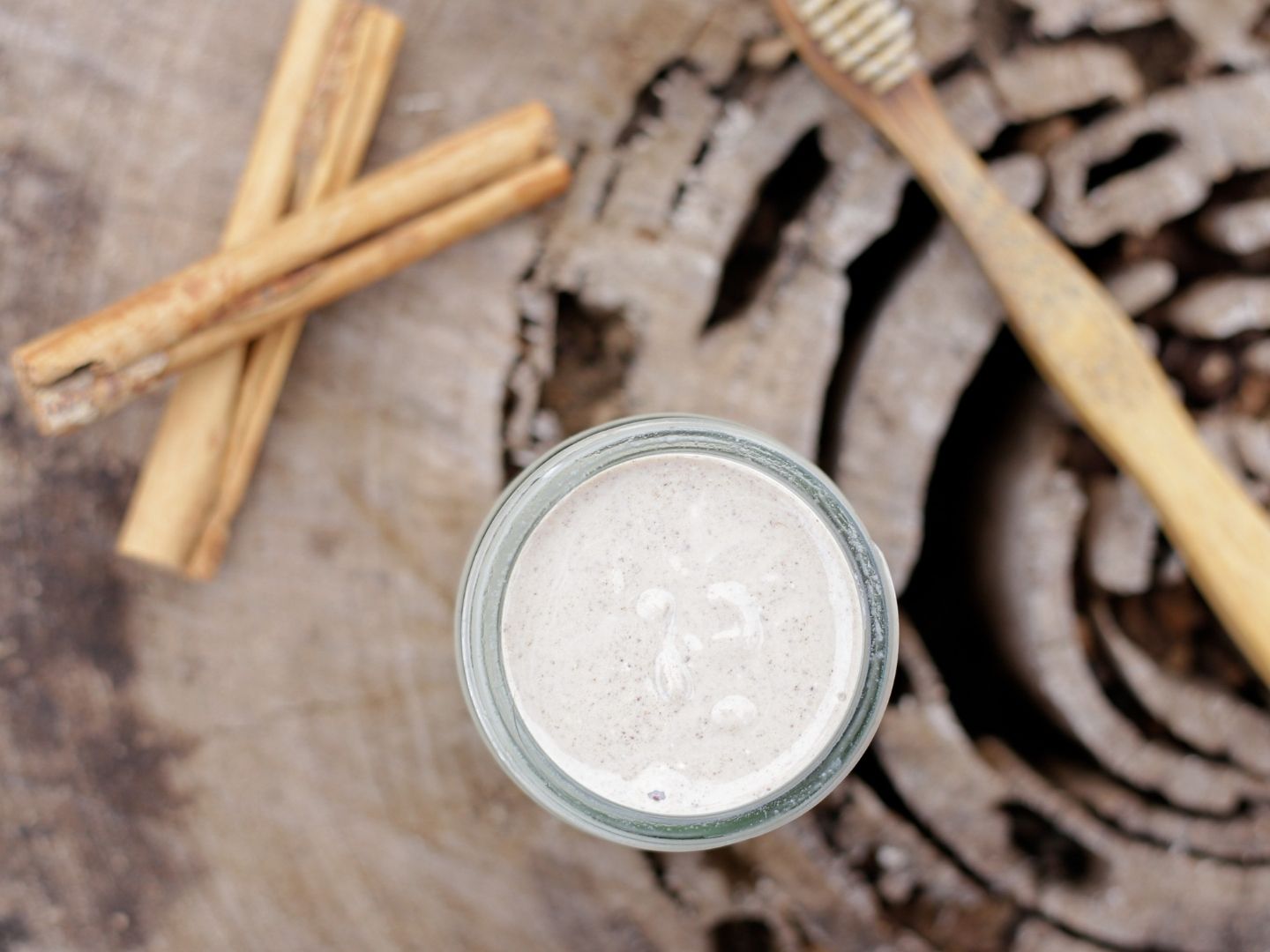
Bentonite Clay
- rich in minerals like calcium, magnesium, silica, sodium, copper, iron and potassium
- remineralises your teeth
- cleansing and detoxing properties
- binds toxins and metals
Bentonite clay is one of my favourite and usually the core ingredient for all my homemade toothpastes. It’s a mineral-rich clay which has the ability to cleanse and detox (because of its electromagnetic ionic charge).
Bentonite clay gets rid of all those baddies in your mouth as it absorbs and binds metals and toxins. Once they’re absorbed, the clay will not release them again. So, in case you accidentally swallow your toothpaste, all these toxins will pass right through you without doing any more harm!
Due to its high content of minerals, bentonite clay may help remineralise your teeth which means it provides essential nutrients and removes harmful bacteria. Consequently, your teeth may be able to rebuild enamel.
Alternatives for bentonite clay in your homemade cinnamon toothpaste
If you live in a country where it is harder to get bentonite clay (most likely in Europe), you may also choose any other mineral clay—as long as it’s food grade.
It’s always important to choose a very fine grade as you don’t want to destroy your teeth by literally sanding down your enamel. French green clay is a great alternative for example!
Coconut Oil
- anti-microbial
- anti-bacterial
- prevents plaque and may even reduce it
- has tooth whitening properties
- may reduce tooth decay and signs of gum disease
Coconut oil is known to be most beneficial for oral care and health. Studies have shown that coconut oil has a great impact on our teeth and gums (especially when oil-pulling).
It has proven to fight harmful bacteria as well as gingivitis (and even gum disease), reduce plaque buildup, and best of it all, it may prevent tooth decay.
Coconut oil technically acts as a natural antibiotic that removes any harmful, cavity-causing bacteria. When using it on a regular basis—as in brushing your teeth daily with coconut oil—it may also hinder bacteria to expand and grow.
Because of that, it is said (word-of-mouth) that you can reverse tooth decay by using coconut oil (especially when practising oil-pulling).
Furthermore, some studies have shown that coconut oil decreases plaque and help prevent new buildup. This might be the reason why there are some people who believe that coconut oil whitens their teeth.
Now, as beneficial as coconut oil is, there’s one downside to it. You probably know it, but just remember, coconut oil becomes liquid at 24°C/76°F or turns solid below this temperature.
Generally, it’s not a big deal but sometimes, particularly if you’re making your toothpaste for a tube, you need it liquid at all times.
In this case, you may prefer fractionated coconut oil. It does not change it’s form and always stays liquid because the long-chain fatty acids were removed leaving only the medium-chain fatty acids behind—the ones we need.
Alternatives for coconut oil to use in your homemade cinnamon toothpaste
- fractionated coconut, if you need a liquid oil
- olive oil
- sesame oil (has a strong taste though)
Homemade Cinnamon Toothpaste - Recipe
📖 Recipe
Equipment
- Preferably, don't use any metal utensils because of the clay’s absorptive properties. Wood, plastic or glass bowl and spoon are better.
Ingredients
- 4 tablespoon bentonite clay food grade
- 3 tablespoon coconut oil liquid
- 1 teaspoon cinnamon ground
- and/or 5-8 drops cinnamon essential oil see notes
- 1 tablespoon xylitol optional
Instructions
- If your coconut oil isn't liquid, melt it in the microwave or over the stove top.
- In a bowl (wood, plastic or glass) mix bentonite clay, ground cinnamon and xylitol (if using) with a spoon or spatula (also, wood, plastic, glass or silicone).
- Now add liquid coconut oil. If using cinnamon essential oil (see notes) add 5 to max. 8 drops to one of the tablespoons of coconut oil before mixing it in.
- Mix until everything is well incorporated and no lumps are left. If the toothpaste seems too crumbly, add more oil. If too runny, add more clay.
- Store in a 60ml / 2oz container. A little glass jar works best.
Notes
- Either use ground cinnamon or cinnamon essential oil. Or, what I prefer, is using both together. However!! Excessive use of cinnamon may lead to swelling, irritations and ulcers!
- Clay - food grade: it's fairly important to use a fine grade (food instead of cosmetic grade) for your clay. Otherwise, your paste will rather feel like sand and might cause damage to your enamel.
- Cinnamon essential oil: I usually use 8 drops in total because my teeth and gums can handle this amount. However, I recommend starting out with 5 and see how it works for you.
- Clove essential oil: Since cinnamon oil is rather expensive, you can also substitute it with clove oil. It’s much cheaper and has nearly the same benefits. I often mix both oils: 5 drops clove, 3 drops cinnamon.
- Xylitol is optional but it's very beneficial, especially if you want to fight cavities!

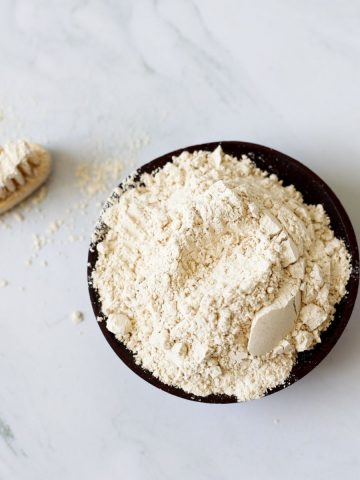
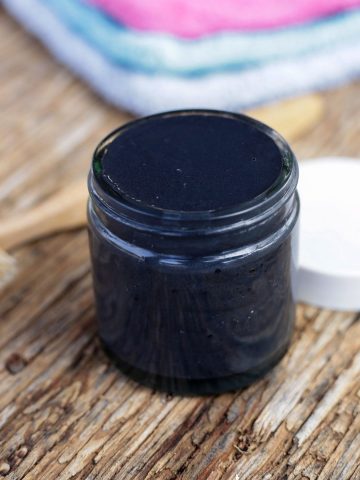
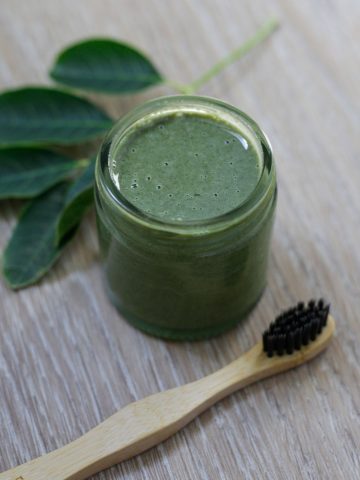
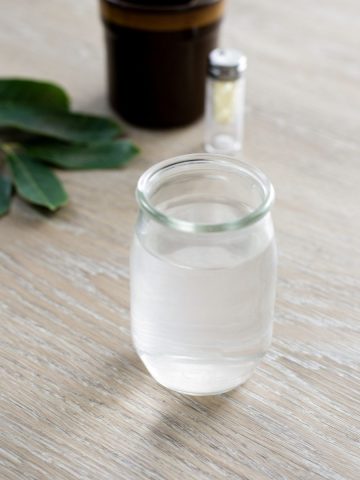
Carrie Willard says
Good to know! Thanks for the link btw. Cinnamon bothers me but it doesn't seem to bother a lot of people. 🙂
Lavender Gypsy says
No worries. Yes, exactly. I think people should just be aware of the side effects that may come up. 🙂
Frankie says
Hi Lavender, just wondering if you could help me, I am looking to do a similar recipe but can't figure if the essential oils need to be food grade or not? I can get cinnamon pure oil but it says it is for diffusers and aromatherapy etc?
Thanks
Lavender Gypsy says
Hi Frankie, as long as it's a pure, high-quality cinnamon essential oil (this is important), it should be fine to use in your toothpaste. Just make sure to only use a couple of drops. Less is more with these strong essential oils! Some aromatherapists and experts don't recommend ingesting essential oils which is why, I guess, your essential oil isn't also labelled "for internal use". However, we're not swallowing the toothpaste but spitting it out - so, I think it's safe. Hope this helps! 🙂